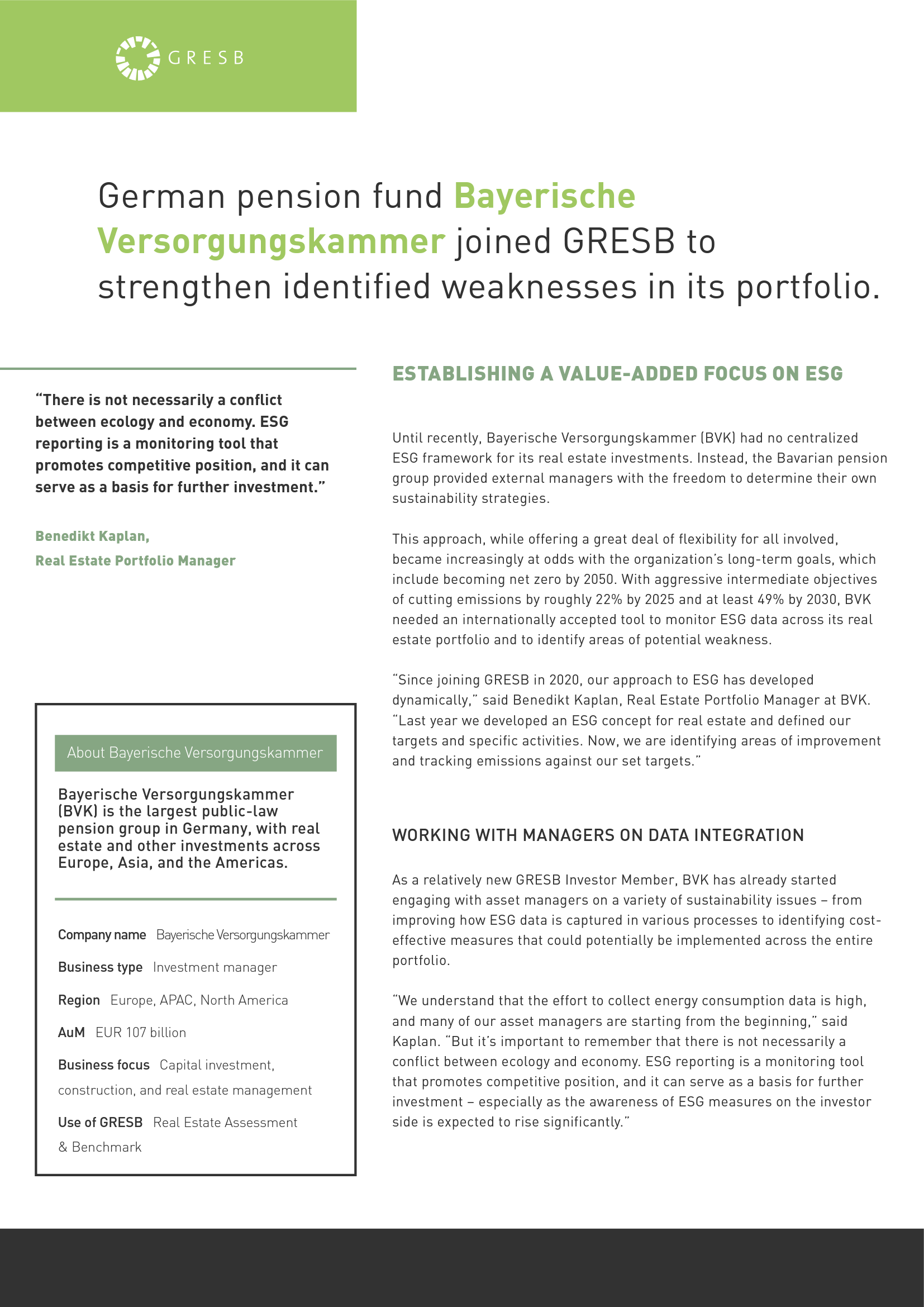German pension fund BVK joined GRESB to strengthen identified weaknesses in its portfolio

Bayerische Versorgungskammer (BVK) is the largest public-law pension group in Germany, with real estate and other investments across Europe, Asia, and the Americas.
Business type: Investment manager
Region: Europe, APAC, North America
AuM: EUR 107 billion
Business focus: Capital investment, construction, and real estate management
Use of GRESB: Real Estate Assessment & Benchmark
Establishing a value-added focus on ESG
Until recently, Bayerische Versorgungskammer (BVK) had no centralized ESG framework for its real estate investments. Instead, the Bavarian pension group provided external managers with the freedom to determine their own sustainability strategies.
This approach, while offering a great deal of flexibility for all involved, became increasingly at odds with the organization’s long-term goals, which include becoming net zero by 2050. With aggressive intermediate objectives of cutting emissions by roughly 22% by 2025 and at least 49% by 2030, BVK
needed an internationally accepted tool to monitor ESG data across its real estate portfolio and to identify areas of potential weakness.
“Since joining GRESB in 2020, our approach to ESG has developed dynamically,” said Benedikt Kaplan, Real Estate Portfolio Manager at BVK. “Last year we developed an ESG concept for real estate and defined our targets and specific activities. Now, we are identifying areas of improvement and tracking emissions against our set targets.”
Working with managers on data integration
As a relatively new GRESB Investor Member, BVK has already started engaging with asset managers on a variety of sustainability issues – from improving how ESG data is captured in various processes to identifying cost-effective measures that could potentially be implemented across the entire portfolio.
“We understand that the effort to collect energy consumption data is high, and many of our asset managers are starting from the beginning,” said Kaplan. “But it’s important to remember that there is not necessarily a conflict between ecology and economy. ESG reporting is a monitoring tool that promotes competitive position, and it can serve as a basis for further investment – especially as the awareness of ESG measures on the investor side is expected to rise significantly.”
For BVK, indirectly held assets represent about 80% of its real estate portfolio, and in its first year about 75% of external managers are participating in the GRESB Assessment, with more expected next year. BVK’s direct portfolio is also expected to take part in the GRESB Assessment by 2023.
Reusing collected data
One particular benefit of ESG reporting with GRESB is the ability to reuse collected data for further analysis, since it is validated and standardized in a way that is compatible with other frameworks. For BVK, the already collected data can be reused for PRI reporting, regulatory disclosure efforts, and for climate-risk analysis.
“We are very interested in leveraging the existing GRESB data and using the Transition Risk Report with our real estate portfolios,” said Kaplan. “We are also using this data to analyze the risks of floods, storms, and extreme temperatures on our portfolio. All the necessary data is already there, so we can easily reuse it across our global portfolio.”
What is the goal for this data? In the short term, BVK is conducting a stranding asset analysis to identify those assets with the most urgent need for improvement. In order to achieve its goal of making all as sets, both directly and indirectly held, compliant with the Paris Climate Agreement in the long term, BVK needs the most accurate information on the status of the consumption data of its portfolio, which can be facilitated by increasing participation in the GRESB Assessment. BVK also aims to identify targeted measures to postpone or avoid the stranding year in accordance with the Paris Climate Agreement. In addition to CO2 emissions, other consumptions – such as waste or water – should be made more efficient with the help of experienced service providers.
Focusing on the future
As a member of the Net Zero Asset Owner Alliance, BVK is focused on achieving reductions in CO2 emissions, but that is not the onl y reason to embrace ESG monitoring. “We want to act more sustainably as a company and enable our external service providers to operate more sustainably and responsibly to drive positive change in the industry,” said Kaplan. “And there are innumerable ways we can improve our portfolio and deliver more for our stakeholders through improved ESG performance.”